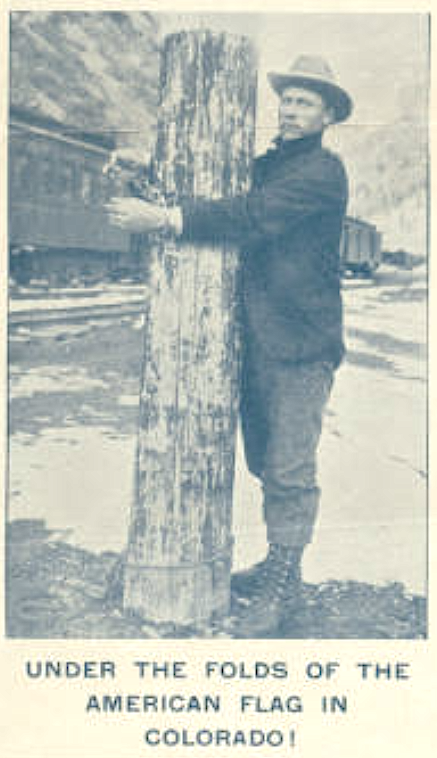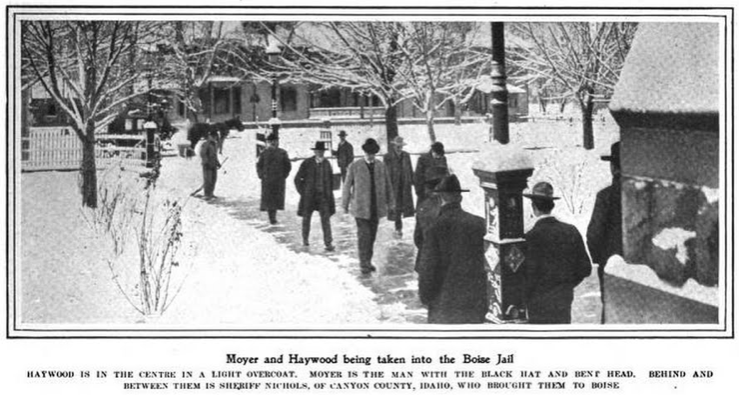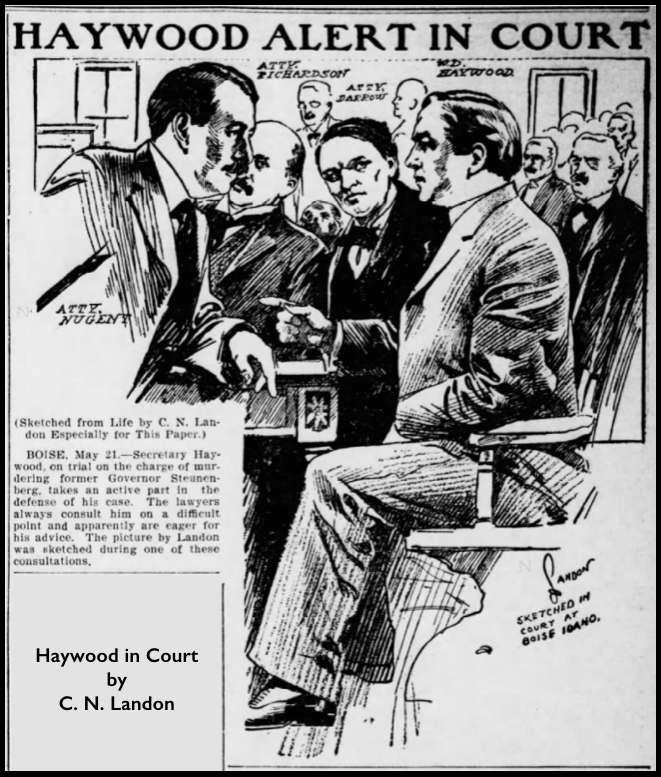A thousand times rather would I be
one of those men in Ada county jail
than Theodore Roosevelt in
the White House at Washington.
-Eugene Victor Debs
Hellraisers Journal, Saturday August 10, 1907
From the Montana News: Debs Reflects on Haywood Verdict
Readers of Hellraisers will remember the controversy begun by Roosevelt when it was revealed, last April, that the President had declared Haywood, Moyer, Pettibone and Debs to be “Undesirable Citizens.”
In the Appeal to Reason of May 18th, Comrade Debs confronted Roosevelt:
Were a mob of workingmen to seize Theodore Roosevelt and chain him to a post on a public street in Washington in broad daylight, as a mob of his capitalist friends seized and chained a workingman [Henry Maki] in Colorado, or throw him into a foul bullpen, without cause or provocation, prod him with bayonets and outrage his defenseless family while he was a prisoner, as was done in scores of well-authenticated cases in both Colorado and Idaho, would he then be in the mood to listen complacently to hypocritical homilies upon the “temperate” use of language, the sanctity of “law and order” and the beauty of “exact justice to all”?
And if he heard of some man who had sufficient decency to denounce the outrages he and his family had suffered, would he then “conceive it to be his duty,” as he tells us, to condemn the language of such a man as “treasonable and murderous” and the man himself as “inciting bloodshed,” and therefore an “undesirable citizen”?
[Photograph added.]
If fighting for the rights of working people makes one an undesirable citizen, then let us hope that millions more would be proud and happy to be classed with the likes of Comrades Haywood and Debs.
In this weeks edition of the Montana News, Eugene Debs suggests that President Roosevelt should tender an apology to the man he declared guilty in advance of the trial. Comrade Debs declares the acquittal of Big Bill Haywood to be a great victory for the American labor movement and a rebuke to the prosecution and to their masters, the Mine Owners’ Association, whose interest the prosecution endeavored to serve. Comrade Debs expresses his great respect for Comrade Haywood and proposes that Haywood should be nominated as the Socialist Party’s candidate for president.
From the Montana News of August 8, 1907:
Debs on the Verdict
—–Gives His Views of the Result of the
Trial and Effect it Will Have
—Triumph of Justice
The acquittal of Haywood is in many respects the greatest victory ever achieved in the history of the American labor movement. The verdict not only vindicates the defendant, but is in the nature of a rebuke to the prosecution.
[Continued Mr. Debs:]
The verdict, it must be admitted, was a surprise to Haywood’s friends and sympathizers. Not that they had any doubt in regard to his innocence, but because of the circumstances under which he was taken to Idaho, and the further fact that he was tried in a hostile community and by a jury composed of his political enemies. Under these circumstances, the best expected was a mistrial of a disagreement by the jurors, and very few were sanguine enough to predict an absolute acquittal.
The original design of the prosecution backed by the Mine Owners’ Association and the Standard Oil Company, who have practical control of Idaho, was the speedy execution of the defendants in the hope of thereby striking a fatal blow to the Western Federation of Miners. But the blow aimed at the Federation and against organized labor in general, has recoiled upon themselves and the effect will be, in my opinion, the acceleration of the solidarity of the working class along the lines of industrial unionism and socialism.
This effect will not be confined to the western states, but will extend to the labor movement in general throughout the nation.
The defense was conducted in a most able and skillful manner. But this alone would not have saved Haywood and his fellow officials. It was the uprising of the working class and the indignation protest of the people in general that thwarted the conspiracy and defeated its moline purpose.
The spirit for the fair play on the part of the American people was never more manifest than in this instance. As the trial proceeded they became convinced that Haywood was innocent and in the face of the fact the prosecution did not dare to force a conviction.
A surprise in the trial occurred in the instructions of Judge Wood to the jury. These were in striking contrast with some of the other features of the trial, and my personal opinion is that the powerful interests that were prosecuting the case, realizing that the American people would not stand for a conviction, and that a conviction would [have had?] a decided bearing upon the approaching national election, brought their influence to bear upon the court in favor of acquittal. This, in my judgement, accounts for the instructions of the court, which amounted to a plea in favor of the defendant for the verdict, resulting in his acquittal.
When Haywood and his associates were first kidnapped and the horrible confession of Orchard, the degenerate, was made public, the sentiment of the people was overwhelmingly against the accused officials and those who knew the men were confident of their innocence were sharply criticized and in fact, condemned for espousing their cause. But the truth was bound to prevail and there is now but one opinion among the fair minded men, and that is a cruel conspiracy has been thwarted and the intended victim has been triumphantly vindicated.
The victory is distinctly a victory of the labor movement for without its widespread, emphatic and persistent protest, these men would have been undoubtedly sealed their fidelity to the working class with their lives.
But justice has triumphed and William D. Haywood, instead of perishing upon the gallows as a convicted felon, now stands in the very fore front of the labor movement of the world.
Knowing him personally, a I do, and confident as I have always been, not only of his innocence of the crime charged against him, but of his loyalty to labor, his ability as a leader, and honesty as a man, I proposed some time ago his nomination by the Socialist Party as its candidate for the presidency, and I now believe that when the national convention meets, his nomination will be made by acclamation, and that the working people of the country will rally to his support.
Incidentally, it may be stated that the verdict of “not guilty” will place President Roosevelt and the Supreme Court in an awkward position; the former for pronouncing judgment on untried men, and the latter for legalizing their kidnapping in a decision that will forever stand to the discredit of that august body.
It is to be hoped that President Roosevelt, in justice to himself will see his way clear to relieve himself of this embarrassment by tendering an apology to the men he accused, who now stand without a blemish before their fellow men and country.
[Not?] only the working men, but the American people in general, are to be congratulated upon this significant and far-reaching triumph of justice.
-Eugene V. Debs.
[Photographs added.]
Hellraisers Journal, Sunday May 19, 1907
Eugene Debs for the Appeal to Reason: “Roosevelt’s Labor Letters”
Montana News
(Helena, Montana)
-Aug 8, 1907
http://chroniclingamerica.loc.gov/lccn/sn84024811/1907-08-08/ed-1/seq-1/
IMAGES
Henry Maki WFM Telluride, Chained to Pole Mar 2, 1907
http://digital.denverlibrary.org/cdm/singleitem/collection/p15330coll22/id/84101/rec/3
HMP, Moyer Haywood to Boise Jail, Harpers May 25, 1907
https://play.google.com/books/reader?id=ErZCAQAAIAAJ&printsec=frontcover&pg=GBS.PA765
HMP, Haywood Alert in Court, Landon, Spk Prs, May 21, 1907
https://www.newspapers.com/image/201689521/
See also:
Hellraisers Journal, Sunday March 3, 1907
From the Appeal to Reason: Eugene V Debs on Government by Gunthug-Mob in Service of Colorado Mine Owners
Hellraisers Journal, Monday March 4, 1907
Telluride, Colorado – The Strike of 1903-1904 Remembered
Remembering Brother Maki of Telluride, Chained to Pole, Miners Still Wonder: “Is Colorado in America?”
Hellraisers Journal, Wednesday April 24, 1907
“Undesirable Citizen” Eugene Debs Takes on “Roosevelt and His Regime” for the Appeal to Reason
Hellraisers Journal, Sunday May 5, 1907
Eugene Debs Reveals: Roosevelt Read “Undesirable Citizen” Letter to Supreme Court Justices



